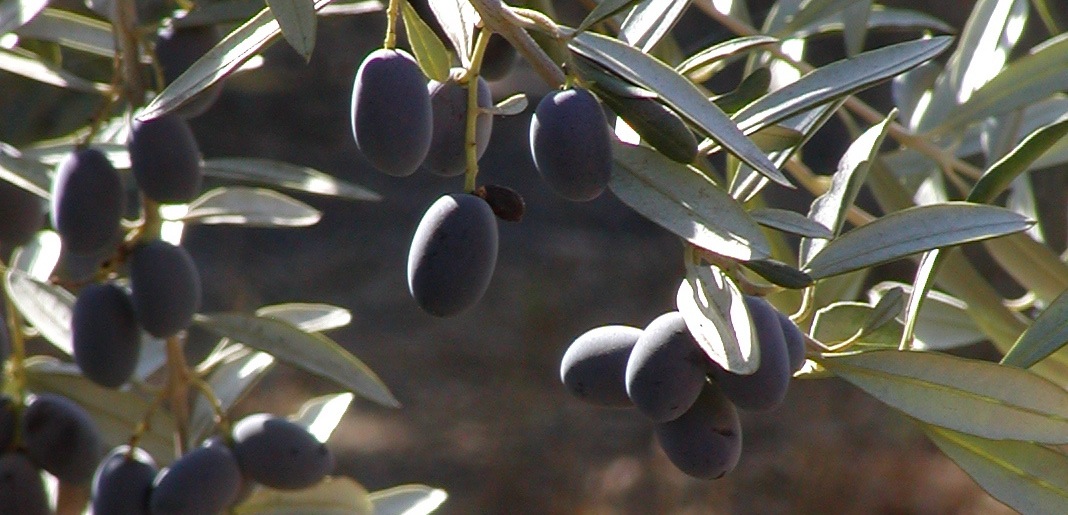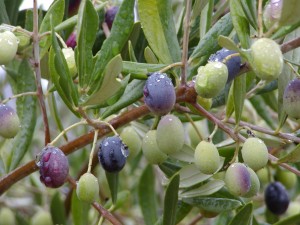The olive oil world is being tempted to follow the wine world down the path of questionable language: it’s time to decide if that is an “olive varietal,” or an “olive variety.” This was brought to my attention by Mike Madison, Yolo County olive oil producer, writer and philosopher. He’ll be embarrassed by me saying that about the philosopher, but it’s true. And personally, I have to admire someone who starts a company called “Yolo Press” because he writes and publishes books, and then proceeds to keep the same name making estate-produced extra virgin olive oil. What are the odds?!
Mike pointed out one day—gently correcting me—that “varietal” is an adjective, “variety” is the noun. So it is an olive “variety” that goes into the mill, and a single “varietal” oil that comes out. If you look up “varietal,” you will see a secondary usage as a noun, applied specifically to grape varieties, but do we olive oil folks need to adhere to that wine-world convention? No one talks about “varietals” in the vegetable garden, or in the apple orchard, do they? If you don’t like the word “variety” and want a different word, another choice (and a very accurate one) is “cultivar.” Personally, I think the word “variety” is very nice, now that I am using it. I speak of olive varieties, and of a varietal blend.
Before you paint me with the schoolmarm brush, know that I don’t have anything against new words entering the language, or old words gaining new meanings. Language is a living thing and continually evolves. I love the way a linguistic clue will sometimes solve an anthropological mystery by showing a connection that left little or no physical trace but did leave linguistic footprints. But sometimes it feels like we’re just being sloppy. We have a perfectly good word like “variety” that says exactly what we need it to say. It comes with the fine modifying form “varietal” to take care of all our adjectival needs. Does using “varietal” as a noun give us anything better? I would argue that it doesn’t.
This may sound like a debate about how many angels can dance on the head of a pin, but I don’t think it is. This is part of a big and very important question that faces the olive oil community: what words will we use when talking about our products? It seems like sometimes we lean towards the words of the wine world—varietal being a good example—and adopt those conventions without really thinking about it. Olive oil and wine share many things, but they can also be very different; blindly adopting wine orthodoxy is not a smart way for us to proceed. I think we can do a lot better if we have a more thoughtful, global and creative approach.
So I make the plea (with apologies to those of you have heard it before): let the olive oil world to stand on its own feet— call a variety a variety, and let varietal do the modifying.


Great post!
Thank you for helping promote precision in the marketing language we use.
“I don’t have anything against new words entering the language…” – Varietal a new word? I think the Oxford English Dictionary may dispute that.
Hi Steve,
I was not suggesting that “varietal” is a new word, it’s the usage as a noun I was talking about. What I didn’t realize until after I posted my piece was that I had stepped into a small but passionate debate in the wine world. The first sign was a tweet that appeared in response to the announcement that I’d posted the article: “Cultivar_bot – Cultivar Awareness – I’m trying to [sic] spanna new movement in wine tweeting. you can help; please use “varietal” only as an adjective!” I thought it was interesting that someone had set this little bot loose in the Twitterverse to advocate for the adjectival use of “varietal.” Then, in a brief correspondence about the possible origin of the use of “varietal” to mean “variety,” Harold McGee pointed me to this article by Kent Benson from Wines & Vines in 2009 which vehement makes the case “Grapes: they are varieties, not varietals.” From what Mr. Benson says, a place we might look for answers is UC Davis…
I agree Alexandra. Let’s keep it simple and understandable. A variety is a variety. A 100% Picual oil is a varietal oil of the variety Picual.
Taking it one step further we could also ask how much should a varietal oil have of a particular variety to be representatively varietal of that variety? 100%, 85%, > 50%. One day we will need to decide.
In the wine industry here it is 85%. That compromise came about because many varietal wines benefit from a little of something else to make the flavour better.
For varietal olive oils I like 100% of that variety. Straightforward and simple.
Another thing that enters the debate with percentages for single varietal olive oils is the pollinizer varieties. I think that a straight 100% of a particular variety to qualify as a single varietal will be impractical for people who have varieties that are not self fertile and require a population of pollinizer trees. If you have a lot of acreage you can harvest the pollinizers separately and market a different varietal oil, but with smaller producers you’ll almost always end up lobbing them in with the main variety for processing. Since 10-15% of another variety is typical for pollination, I’d be inclined to go with 85% of a particular olive variety to qualify as a single varietal oil. So, okay, on this one I’d do the same thing as the wine guys!
Excellent post. Thanks for clarifying, especially as it pertains to the world of olive oil.